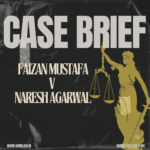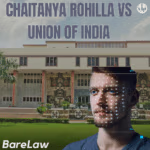DHULABHAI
VERSUS
STATE OF MADHYA PRADESH
AIR 1969 SC 78, 1968 SCR (3) 662.
Equivalent citations: AIR 1969 SC 78, 1968 SCR (3) 662.
Name of the Court: Supreme Court of India
Appellants: Dhulabhai and Ors.
Respondent: State of Madhya Pradesh and Ors
Date of Judgment: April 05, 1968
Bench: M. Hidayatullah, C.J.
A.N. Grover
C.A. Vaidialingam
K.S. Hegde
R.S. Bachawat
Statute
The legal principles or the law involved in this case are:
- The Code of Civil Procedure, 1908
- The Constitution of India
- Madhya Bharat Sales Tax Act (Act 30 of 1950)
Facts
The appellants of tobacco (dealers) sourced for tobacco from local and interstate places in order to sell it for various uses such as smoking, eating and manufacture of bidis locally in Ujjain.
On May 1950, Madhya Bharat Sales Tax Act (Act 30 of 1950) was introduced. As per the provisions provided under this act, every dealer with sales exceeding five thousand rupees for an importer and manufacturer and twelve thousand rupees in other cases had a liability to pay sales tax on sale or supply of goods (section3).
This act enables the government to specify through Section 5 the point at which taxes are due on sales, fixes both minimum and maximum rates of tax by notification.
These notifications imposed different rate of taxes on tobacco while some sellers dealing with same price tobacco were exempted from payment of taxes.
Through these actions, appellants served notices under section 80 CPC and filed suits herein seeking refund of the illegal collected tax which violated the constitutional provision.
Issues
Whether imposition of different rates of non-uniform taxes from importers or manufacturers was violative Article 301 & Articles 304(a)of Indian Constitution?
Whether the present suit was maintainable in light of Section 17of Madhya Bharat Sales Tax Act, 1950?
Whether jurisdiction conferred upon taxing authorities includes jurisdiction to determine whether transaction is real or only its character or a decision on collateral fact?
Question arose whether taxpayer must seek remedy either through civil court’s action requesting repayment or such orders could also be entertained by High Court exercising writ jurisdiction conferred under Article 226of Indian constitution?
Where defence of Limitation Act1963 can be taken?
Contention by Appellant
It is argued by appellant that according to Section9of Code Of Civil Procedure all civil suits can be tried except those when expressly barred which means that civil court’s jurisdiction subsumes all cases unless expressly excluded by statute law or by necessary implication arising from it and also Article 301 that prohibits imposition of tax. With reference to the above referred provisions, the question is whether this suit was expressly barred by Section17of Madhya Bharat Sales Tax Act.
In a number of similar cases such as Bhailal Bhai Gokal Bhai v. State of M.P and State of Tripura v. The Province of East Bengal based on similar facts and circumstances, District Court Judges had held that commissioner or appellant authority must refund overpaid taxes to taxpayers (Section 21of Madhya Bharat Sales Tax Act.). In the first case, government notifications were held ultra vires while Art.304(a) does not save Art.301of Constitution.
The question of the competence of the high court in such matters was raised. They argued that during the hearing of suit number 3492/97 on the correctness of imposition of tax, this court held that “assessment made under this act shall not be called in question in any court”, Appellant’s argument is misconceived as no writ petition challenging taxation demands has ever been entertained by this Court.
Argument by Respondent
The contention advanced was that they were levying taxes within specific sections enacted by Madhya Bharat Sales Tax Act (Act 30 of 1950) in the year 1954.
If it is a matter concerning constitutional or statutory validity or assessing legitimacy of its incidence, section 17 tells us that any assessment under this Act cannot be validly challenged before any Court: then how can court decide it?
Judgment
Therefore, after conclusion, one should understand that since these decisions have always held sway in all instances where they have been tried, there arose no necessity to go into details with them. When tax liability is created and remedies for default provided for by statute like Income-Tax Act., then it is incumbent upon assessee to follow those remedies and not resort to ordinary law courts.
Court relied on Raleigh Investment Co. v Governor-General Council and other cases where it found out that such questions had already been answered and therefore judgment was passed accordingly. It should be held when taxing statutes make provisions regarding remedy for recovery of balances due towards outstanding taxes etc., then there is an obligation on the part of assessee to exhaust only statutory remedies available even though their claims may be disputed before civil courts.
In dealing with limitation period, court said that if within three years from date on which writ petition was filed refund would apply but once time elapses beyond three years thereafter High Court would refuse to deal with such cases meaning thereby no refund would be obtainable as according to Civil Courts Limitation Limitations imposing authorities can only be sued in Civil court.
Under the Government of India Act, 1935 and Indian Income Tax Act, 1922 the jurisdiction over civil courts was ousted by Section 226 and Section 67 respectively.
The Supreme Court has subsequently held in K.S.Venkataraman & Co. v. State of Madras that a High Court has power to raise the question as to the validity of provisions made under any Act.
References show that many laws have been enacted which provided for finality without expressly excluding jurisdiction of civil courts or creating adequate machinery for raising questions before authorities.
The judge went on to analyze the remedies given under the Indian Income-tax Act and found out that they were all created by statute; hence their decision to assess income tax could not be quashed and it was held in favour of taxing authorities.
Judgment principles
In Hidyatullah, C.J. summarized the following principles regarding the ouster of civil court jurisdictions:
Whereas, if a statute is capable of granting reprieve to orders passed by special tribunals, then the jurisdiction of a civil court should be ousted simply because there is an effective remedy available to perform what ordinary courts would otherwise do in a suit. However, if the provisions of any particular Act have not been complied with or the quasi-judicial tribunal has not acted according to fundamental norms of legal process then such jurisdiction by a civil court is not barred.
While it is permissible to use scheme of a particular legislation as evidence determining whether jurisdiction has been excluded or not when there are bars on judicial review, but this does not conclusively determine whether it will be proper for a common law court to assume jurisdiction.
Where there is no express exclusion the examination of the remedies and scheme becomes necessary to find out whether they are consistent with justice or against common good.
Any provision declared ultra vires under that Act cannot be called in question before tribunals created under that very Act. Similarly even high court cannot challenge this matter.
Once a provision has been declared unconstitutional or validity thereof has been questioned, then that matter is always open for litigation. For those suitor
Section nine of the civil proceedings code (CPC) is known as the entrance to this Act, and it mainly tackles the question of jurisdiction of the civil court. It states that unless its cognizance has been expressly barred or is impliedly barred, a civil court has jurisdiction to entertain any suit of a civil nature. From the mentioned case above it can be seen that even if there is a bar on jurisdiction for a civil court, it can still determine whether or not an act has been done in contravention of law as contained in any statute or whether an order was passed dehors such provisions. Although the Civil Court does have jurisdiction to determine whether a tribunal/quasi-judicial body or statutory authority is acting within its jurisdiction, once it is found that such authority had initial jurisdiction then no wrong order made by the court would be given to the authority.
References
Cases
- Bhailal Bhai Gokal Bhai v. State of M.P 1960 11 STC 511 MP
- State of Tripura v. The Province of East Bengal, 1951 AIR 69, 1951 SCR 51
- Raleigh Investment Co. v. Governor-General Council, 1943 11 ITR 393 Cal
- Secretary of State v. Mask, (1940) 42 BOMLR 767
- I. S. Chetty & Sons v. State of Andhra Pradesh, 1964 AIR 322, 1964 SCR (1) 752
- K. S. Venkataraman & Co. v. the State of Madras, AIR 1961 Mad 322, (1961) 1 MLJ 163, 1961 12 STC 138 Mad
Bare Acts
- The Code of Civil Procedure, 1908
- The Constitution of India
- Madhya Bharat Sales Tax Act (Act 30 of 1950)
Links
- http://www.legalservicesindia.com/article/508/Jurisdiction-Of-Civil-Court-Under-Civil-Procedure-Code.html
- http://roundup.manupatra.in/trans/viewdoc.aspx?i=ptiDy4oUEz7W4RhahAaT6h93RFUeTV40hI1vo81W7g5uCfRP5tL0pktJVchar(43)F5g3qk&id=zwKDa4S8QbBCBSkXPhUPwY5CqQmaAQ/9fT/TmfIpDN9JvkzGTLOC3wPA/vBfnpGh7b3oZ6Ij7Rud2ibPGirCBQ==
- https://indiankanoon.org/doc/1996908/#:~:text=In%20Bhailal%20v.-,M.P.,point%20in%20State%20of%20M.P.
- https://india.lawi.asia/dhulabhai-and-ors-v-the-state-of-madhya-pradesh-and-anr/



